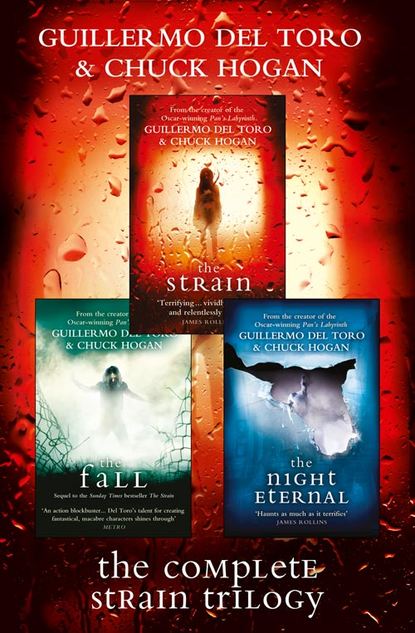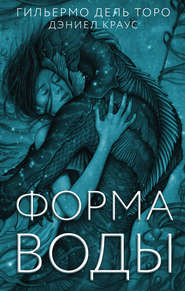По всем вопросам обращайтесь на: info@litportal.ru
(©) 2003-2025.
✖
The Complete Strain Trilogy: The Strain, The Fall, The Night Eternal
Автор
Год написания книги
2018
Настройки чтения
Размер шрифта
Высота строк
Поля
Setrakian lowered his sword and pulled the lamp from Eph’s hands, holding the fading beam close to the girl’s open neck wound, almost in a gesture of triumph. But triumph it was not: Eph saw things wriggling in the seeping pool of thick white blood.
The parasitic worms. They curled tight and went still when the light hit them. The old man was irradiating the scene.
Eph heard footfalls on the stone steps. Nora, racing out through the bulkhead. He ran after her, nearly tripping over the decapitated body of the girl’s father, surfacing onto the grass and the night air.
Nora was running to the swaying, dark trees. He caught up to her before she reached them, pulling her close, wrapping her up tight. She screamed into his chest, as though afraid to allow her cry to escape into the night, and he held her until Setrakian surfaced onto the yard.
The old man’s breath steamed into the cool night, chest pumping from exertion. He pressed his fingers to his heart. His white hair was mussed and shiny in the moonlight, making him appear—as did everything to Eph, at that moment—quite mad.
He cleaned his blade on the grass before returning it to the sheath end of the walking stick. He fixed the two pieces together with a firm twist, and the overlong walking stick was as it had been before.
“She is released now,” he said. “The girl and her father are at peace.”
He was checking his shoes and pants cuffs for vampire blood in the moonlight. Nora viewed him through wild eyes. “Who are you?” she said.
“Just a pilgrim,” he answered. “Same as you.”
They walked back to Eph’s Explorer. Eph felt all jittery and exposed out in the front yard. Setrakian opened the passenger door and pulled out a spare battery pack. He swapped batteries with the one in Eph’s lamp, then checked the purple light briefly against the side of the truck.
Setrakian said, “You wait here please.”
“For what?” said Eph.
“You saw the blood on her lips, her chin. She was flushed. She had fed. This is not done yet.”
The old man set off toward the next house. Eph watched him, Nora leaving Eph’s side in order to lean against the truck. She swallowed hard, as though about to be sick. “We just killed two people in the cellar of their own home.”
“This thing is spread by people. By un-people.”
“Vampires, my God …”
Eph said, “Rule number one is always—fight the disease, not its victims.”
“Don’t demonize the sick,” said Nora.
“But now … now the sick are demons. Now the infected are active vectors of the disease, and have to be stopped. Killed. Destroyed.”
“What will Director Barnes say about that?”
Eph said, “We can’t wait for him. We’ve already waited too long.”
They fell silent. Soon Setrakian returned carrying his walking stick/vampire sword and the still warm lamp.
“It is done,” he said.
“Done?” Nora said, still appalled by what she had seen. “Now what? You do realize there were some two hundred other passengers aboard that plane.”
“It is much worse than that. The second night is upon us. The second wave of infection is happening now.”
THE SECOND NIGHT (#)
Patricia ran a hand vigorously back through her hair, as though shaking out the lost hours of another day gone by. She found herself actually looking forward to Mark coming home, and not just for the satisfaction of throwing the kids at him and saying, “Here.” She wanted to fill him in on the only real news of the day, the Lusses’ nanny—who Patricia spied through the sheers of the front-facing dining room windows—racing out of the Lusses’ house not five minutes after arriving, children nowhere in sight, the old black woman running as if she was being chased.
Oooh, the Lusses. How neighbors can get under your skin. Whenever she thought of skin-and-bones Joanie tossing off a description of her “European-style pure-soil wine cellar,” Patricia shot an automatic middle finger in the general direction of the Luss house. She was dying to find out what Mark knew about Roger Luss, if he was still overseas. She wanted to compare notes. The only time she and her husband seemed to get on the same page was when they were tearing down friends, family, and neighbors. Maybe because savoring others’ marital problems and family misfortunes somehow made hers and Mark’s seem less troublesome.
Scandal always went better with a glass of pinot, and she finished off her second with a flourish. She checked the kitchen clock, with sincere thoughts of pacing herself, given Mark’s predictable impatience whenever he arrived home to find her two drinks ahead of him. Screw him, snug in his office in the city all day, doing his lunches, walking about at his leisure, hobnobbing on the late train home. Meanwhile, she was stuck here with the baby and Marcus and the nanny and the gardener …
She poured herself another glass, wondering how long it would be until Marcus, that jealous little demon, went in to wake up his napping sister. The nanny had put Jacqueline down before she left, and the little baby hadn’t woken up yet. Patricia checked the clock again, remarking at this extended period of quiet in the house. Wow—sleeping like a champ. Fortified with another swallow of pinot, and mindful of her impish little four-year-old terrorist, she pushed back the ad-crammed Cookie magazine and started up the back steps.
She looked in on Marcus first, finding him lying facedown on the New York Rangers rug next to his sleigh bed, his portable game-unit thingy still turned on near his outstretched hand. Worn out. Of course, they would pay dearly for this late nap when the whirling dervish wouldn’t settle down at bedtime—but by then it would be Mark’s turn to deal.
She went down the hall—puzzled by and frowning at a few clumps of dark soil on the runner (that little demon)—to the closed door with the SH-SH-SH!—ANGEL SLEEPING heart-shaped silk pillow hanging from the doorknob on a frilly lace ribbon. She eased it open on the dim, warm nursery, and was startled to see an adult sitting in the rocking chair next to the crib, swaying back and forth. A woman, holding a little bundle in her arms.
The stranger was cradling baby Jacqueline. But in the quiet warmth of the room, under the softness of the recessed lighting, and feeling the high pile of the rug underfoot, everything still seemed okay.
“Who …?” As Patricia ventured in farther, something in the rocking woman’s posture clicked. “Joan? Joan—is that you?” Patricia stepped closer. “What are you …? Did you come in through the garage?”
Joan—it was her—stopped her slow rocking and stood up from the chair. With the pink-shaded lamp behind her, Patricia barely made out the odd expression on Joan’s face—in particular, the strange twist of her mouth. She smelled dirty, and Patricia’s mind went immediately to her own sister, and that horrible, horrible Thanksgiving last year. Was Joan having a similar breakdown?
And why was she here now, holding baby Jacqueline?
Joan extended her arms to hand the infant back to Patricia. Patricia cradled her baby, and in a moment knew that something wasn’t right. Her daughter’s stillness went beyond the limpness of infant sleep.
With two anxious fingers, Patricia pinched back the blanket covering Jackie’s face.
The baby’s rosebud lips were parted. Her little eyes were dark and fixed and staring. The blanket was wet around her little neck. Patricia’s two fingers came away sticky with blood.
The scream that rose in Patricia’s throat never reached its destination.
Ann-Marie Barbour was literally at her wits’ end. Standing in her kitchen, whispering prayers and gripping the edge of the sink as though the house she had lived in all her married life were a small boat caught in a swirling black sea. Praying endlessly for guidance, for relief. For a glimmer of hope. She knew that her Ansel was not evil. He was not what he seemed. He was just very, very sick. (But he killed the dogs.) Whatever illness he had would pass like a bad fever and everything would return to normal.
She looked out at the locked shed in the dark backyard. It was quiet now.
The doubts returned, as they had when she saw the news report about the dead people from Flight 753 who had disappeared from the morgues. Something was happening, something awful (He Killed the Dogs)—and her overwhelming sensation of dread was alleviated only by repeated trips to the mirrors and her sink. Washing and touching, worrying and praying.
Why did Ansel bury himself under the dirt during the day? (He killed the dogs.) Why did he look at her with such craving? (He killed them.) Why wouldn’t he say anything, but only grunt and yowl (like the dogs he killed)?
Night had again taken the sky—the thing she had dreaded all day.
Why was he so quiet out there now?
Before she could think about what she was doing, before she could lose her reserve, she went out the door and down the porch stairs. Not looking at the dogs’ graves in the corner of the yard—not giving in to that madness. She had to be the strong one now. For just a little while longer …
The shed doors. The lock and the chain. She stood there, listening, her fist pressed hard against her mouth until her front teeth started to hurt.
What would Ansel do? Would he open the door if it were she inside? Would he force himself to face her?
Yes. He would.








